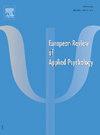Psychometric properties of the 10-item English-language Social Provisions Scale
IF 1.4
4区 心理学
Q3 PSYCHOLOGY, APPLIED
European Review of Applied Psychology-Revue Europeenne De Psychologie Appliquee
Pub Date : 2025-09-27
DOI:10.1016/j.erap.2025.101098
引用次数: 0
Abstract
Introduction
One of the most widely used self-report questionnaires to assess perceived social support is the Social Provisions Scale (SPS; Cutrona & Russell, 1987). This 24-item scale was designed to measure six dimensions of social support. A brief, 10-item version of the SPS was developed by Caron (SPS-10; Caron, 2013).
Objectives
This study examined the reliability, dimensionality and criterion validity of the English-language SPS-10.
Method
SPS-10 data from 19,656 respondents (8,928 men and 10,728 women) of the Canadian Community Health Survey (CCHS) were subjected to exploratory and confirmatory factor analysis. The external validity of the total score and the suggested dimension scores was assessed through correlations with three criterion health variables: psychological distress, positive mental health, and perceived health.
Results
Principal component analysis of the SPS-10 revealed a single dimension of social support. Confirmatory factor analyses of various models were also consistent with a unidimensional interpretation of the SPS-10 scores. Although the reliability of the total score was satisfactory (Cronbach’s alpha coefficient of 0.93), the reliabilities of the suggested dimension scores were moderate. The dimension scores do not show evidence of differential validity with respect to the health variables examined.
Conclusion
In light of the results of various factor analyses and given the lack of external validity exhibited by the suggested dimensions, SPS-10 scores are best conceptualized as unidimensional. The use of SPS-10 dimension scores is not recommended.
十项英语社会保障量表的心理测量特性
社会保障量表(social Provisions Scale, SPS; Cutrona & Russell, 1987)是应用最广泛的评估感知社会支持的自我报告问卷之一。这个24项的量表被设计用来测量社会支持的六个维度。Caron (SPS-10; Caron, 2013)开发了一个简短的10项SPS版本。目的检验英语SPS-10量表的信度、维度和效度。方法对加拿大社区健康调查(CCHS) 19,656名调查对象(8,928名男性和10,728名女性)的sps -10数据进行探索性和验证性因素分析。通过与心理困扰、积极心理健康和感知健康三个标准健康变量的相关性来评估总分和建议维度得分的外部效度。结果社会支持量表主成分分析显示社会支持维度单一。各种模型的验证性因素分析也与SPS-10分数的单向度解释一致。虽然总得分的信度令人满意(Cronbach 's alpha系数为0.93),但建议维度得分的信度一般。维度得分没有显示出与所检查的健康变量相关的差异效度证据。结论根据各种因素分析的结果,并考虑到所建议的维度缺乏外部效度,SPS-10得分最好被概念化为一维。不建议使用SPS-10维度评分。
本文章由计算机程序翻译,如有差异,请以英文原文为准。
求助全文
约1分钟内获得全文
求助全文
来源期刊

European Review of Applied Psychology-Revue Europeenne De Psychologie Appliquee
PSYCHOLOGY, APPLIED-
CiteScore
2.20
自引率
20.00%
发文量
38
期刊介绍:
The aim of the Revue européenne de Psychologie appliquée / European Review of Applied Psychology is to promote high-quality applications of psychology to all areas of specialization, and to foster exchange among researchers and professionals. Its policy is to attract a wide range of contributions, including empirical research, overviews of target issues, case studies, descriptions of instruments for research and diagnosis, and theoretical work related to applied psychology. In all cases, authors will refer to published and verificable facts, whether established in the study being reported or in earlier publications.
 求助内容:
求助内容: 应助结果提醒方式:
应助结果提醒方式:


